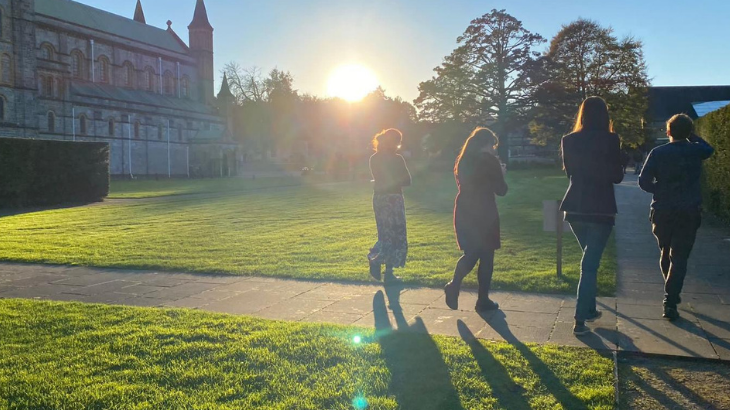
The Understanding Change Research Cluster talks about their recent collaborative writing retreat at Buckfast Abbey.
As PhD researchers in the humanities, we tend to work alone on our own individual projects. Unlike in the sciences, it is unusual for us to publish work collaboratively, and we are not in the habit of researching or writing as part of a group. This is not an original observation, and there have been efforts to introduce more collaborative ways of working into the humanities for some time. However, the experience as a PhD student remains a solitary one – an experience exacerbated by the pandemic.
It was for this reason that we, the Understanding Change research cluster (led by Maria Rupprecht, Iona Ramsay, Kerstin Grunwald-Hope and Mark Higgins), decided to organise a workshop that would help introduce PhD researchers to the experience of working on publications collaboratively. With the generous support of the DTP, we were able to put on a four-day, in-person collaborative writing workshop at Buckfast Abbey.
The idea was that we would bring together PhD researchers from across different disciplines and form small groups of two or three people based on shared interests, who would then collectively write an article drawing on the ideas that emerged from these creative intellectual encounters. There would be a writing coach (the wonderful Dr Pam Lock) who would guide us through the process, and we would use the cluster theme – which neatly coincided with this year’s Question journal themes of innovation and sustainability – as the basis for our interdisciplinary encounters.

The results exceed our expectations by far. Although our fields of expertise varied rather wildly from historical linguistics to quantum physics, philosophy of mind to cultural semiotics, and early modern history to minority language literature, we quickly found overlapping interests. After an afternoon of academic speed dating, involving captivating yet positively challenging interdisciplinary exchange, and an evening at the bar, we had found people to work with and projects to work on.
One group found that their research was linked by the question of how technological innovation could be sustainable within communities: this brought together research on early modern London, the British telegraphic network, and the evolution of Dubstep.
Another group linked their research on consciousness, quantum computing and medical ethics to explore possible responses to the multiple worlds theory. A third group discovered an unlikely parallel between Cornish culture and its Mexican diaspora and Silesian culture and its Texan diaspora.
The final group explored the changing meanings of martyrdom and its transcultural resonances, from a 13th century manuscript to contemporary 21st century martyrologies.

Each group decided on where they wanted to try and publish their article, and the connections that were forged during this workshop will continue as the writing, editing, and publishing process continues. We will meet again in March to reflect on the journeys we have been on and where these encounters have taken us. But for now, with the aid of some Buckfast wine and the fresh air of Dartmoor, we have discovered how these kinds of unusual crossovers and collaborations beyond the humanities can spark entirely new ways of thinking.
The workshop was experimental in nature, and our disciplinary conventions and boundaries have been crossed and challenged, but we have seen how our research might be able to reach audiences we never thought it could find.

Understanding Change Research Cluster enjoying hot drinks in the grounds of Buckfast Abbey
As a cluster, we want to take this workshop further by hosting similar events in the future. We want to help develop a culture of interdisciplinary cooperation that can allow us to move beyond academic silos, and to learn from each other’s disciplines and areas of expertise. We want to create a challenging and inspiring community of researchers who can build on these relationships throughout their careers, helping generate new ideas and possibilities.
This kind of collaborative working remains peripheral to the PhD process, but by embedding the experience of it within the doctoral training programme, we hope this kind of workshop will tempt and inspire researchers to take collaborative working further, and to explore the rich potential it offers for all our research.
Find the Understanding Change Research Cluster on Twitter: @change_cluster
Categorised in: Student Blogs